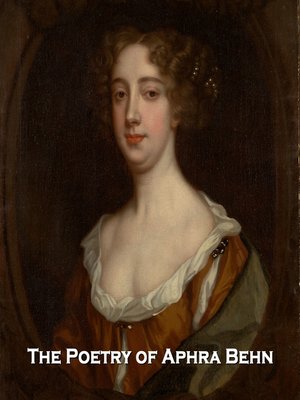
Sign up to save your library
With an OverDrive account, you can save your favorite libraries for at-a-glance information about availability. Find out more about OverDrive accounts.
Find this title in Libby, the library reading app by OverDrive.



Search for a digital library with this title
Title found at these libraries:
| Loading... |
Aphra Behn was a prolific and well-established poet and playwright but facts about her life remain scant and difficult to confirm. What can safely be said is that Aphra Behn is regarded as a key English playwright and a major figure in Restoration theatre. Her poetry is now far more appreciated and seen as a breakthrough for women of the 17th Century and beyond.
Aphra was baptised on 14th December 1640 and grew up with the gathering tensions leading to the English Civil War, a time of much division and difficulty as the King, Parliament, and their respective forces, came closer and then finally into open conflict.
By 1664 her marriage was over, less than a year after it began. She now used Mrs Behn as her professional name and moved towards pursuing a more sustainable and substantial career, working for the King's Company and the Duke's Company players as a scribe. Her first play 'The Forc'd Marriage', was staged in 1670, and thereafter many followed, including her later comic works, which were more commercially successful. She wrote 19 plays in all and contributed to many others as well as several works of prose.
Along with her literary career there are claims she was a spy, that she travelled abroad, possibly as far as Surinam. She also claimed to have met a slave leader in Africa and based her story 'Oroonoko' on his life. Other accounts suggest that during her life she was also known as Ann Behn, Agent One-Sixty and Astrea. Her financial troubles seem to have also incurred her a brief stay in a debtors' prison. Whatever the truth, both her life and work seem rich, textured and full of adventure.
From the mid 1680's Aphra's health began to decline. This was exacerbated by her continual state of debt and descent into poverty although she was often fond of saying that she had led a 'life dedicated to pleasure and poetry.'
Aphra Behn died on 16th April 1689. She is buried in the East Cloister of Westminster Abbey and the inscription on her tombstone reads: "Here lies a Proof that Wit can never be Defence enough against Mortality."






